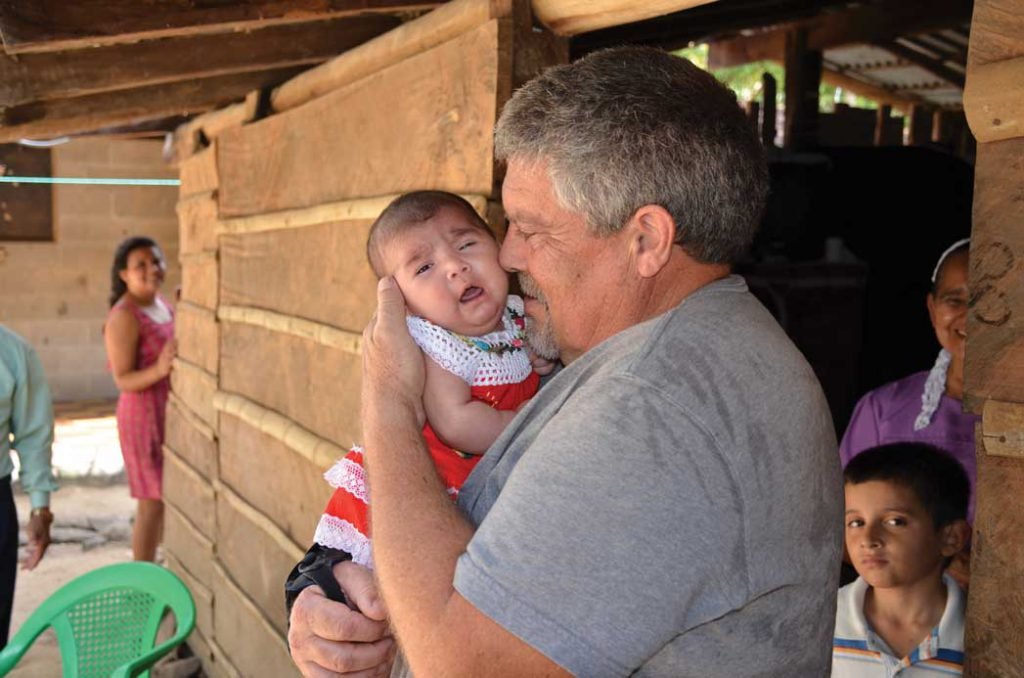+ By Theresa C. Sanchez
In today’s busy world of fractured attention spans and seemingly never-ending to-do lists, it’s easy to lose sight of what’s really important. While most people consult virtual and human assistants, perpetual planners, and piles of Post-It® Notes, Annapolis businessman Sveinn Storm, in an effort to prioritize and recall life’s myriad details, needs to look no further than his left forearm.
There, you will find the Bible verse “Act justly, love mercy, and walk humbly with your God” (Micah 6:8) tattooed in black serif font on his weathered tan skin.
“I wish I lived them more consistently. [They’re] good goals for all of us, whether you believe in God or not,” says Storm, who took a year to decide to ink the permanent reminder. “Every day presents opportunities for me to serve others everywhere. I’m a work in progress, with a long way to go.” The 63-year-old Iowa native has spent nearly a lifetime working to personify those nine words.

Storm owns Storm Bros. Ice Cream Factory and operates Mission To Morazán, a 501(c)(3) nonprofit organization providing humanitarian aid to at-risk communities in Morazán, El Salvador. He never planned on working for anyone else.
His parents led by example, instilled a strong work ethic, and encouraged his entrepreneurial aspirations while he was an adolescent living in Mesquite, Texas. By age 15, Storm had secured a driver’s license, launched a lucrative curb painting venture, and co-owned a miniature golf course in Dallas with his brother Thomas. Storm’s early real-world exposure benefited his wallet and his mind, affording him extra spending money and challenging him to critically think about the world around him.

In 1971, his family moved to Annapolis. A year later, Storm graduated from Annapolis High School and went on to study business at Anne Arundel Community College, enhancing his course load with practical experience co-managing the Baskin-Robbins franchise on Forest Drive with his brother.
It wasn’t long before Storm developed a mentor relationship with many of the young clientele who came through the door. After scooping their creamy confections of choice, he’d give them a task to do before leaving, such as coloring or finishing their homework. He soon discovered the children’s challenges were as diverse as the store’s “31® Flavors.” Although he realized many lived in poverty, he was unaware of the extent. He lay awake nightly, worrying about each child’s welfare. This was not the first time the topic of life’s injustices stimulated Socratic dialogue within himself and with others, particularly his parents.
Their perennial response, “What are you going to do about it?” compelled Storm to make the conscious decision to volunteer his free time facilitating weekend activities such as intramural sports, trips to Navy football events, and game nights for the children. “I wanted them to know they had value,” he says. “I was in a position to help, and to not do so would have been wrong.”
The brothers attempted to secure a lessee option to purchase the ice-cream store, but apparently, their “youth and long hair did not look the part of businessmen,” says Storm. Unfazed, the two men established their own string of eponymously named dessert destinations and employed many of the patrons he once guided. Currently, the downtown Annapolis storefront on Dock Street is the only one still operating. Storm spent the next 14 years also operating two private companies specializing in residential construction and flooring. The relationships he cultivated within the carpentry industry eased a transition into custom furniture and cabinetry manufacturing. As if his plate wasn’t already full, he also took up animal husbandry. Five years ago, he downsized Shore Nuff Farm and now raises Dexter cattle.

Some say that success is when preparation meets opportunity. While Storm didn’t know it at the time, each of the skills he had acquired along his unconventional career path would serve a greater purpose. Youth pastor Christian Graham of Safe Harbor Presbyterian Church in Stevensville helped him arrive at this newfound realization in 2010. Graham, who has known Storm for over 45 years, thought that his unique skill sets would be useful for a stove installation project in Morazán.
Graham has traveled with his church to the impoverished El Salvadoran province 42 times since a 7.6-magnitude earthquake devastated its infrastructure in 2001. The initial call to action came from a local Salvadoran man who befriended one of Graham’s colleagues. According to the American Immigration Council, as of 2017, El Salvador was the top country of origin for emigrants arriving in Maryland, with Salvadorans accounting for 13.2 percent of the state’s nearly 912,000 immigrants.
“My goal really is twofold. I bring people with me to raise money for the Salvadorans as well as work with and encourage them,” says Graham. “But it’s partly for the [volunteers] we bring with us. The experience really changes their perspective on life. We hope they fall in love with El Salvador, just like Sveinn has.” To say Storm fell hard is an understatement. He resolved to return to El Salvador, and did so the following year with his daughter, Sophie. His wife, Leslie, and son, George, joined him on subsequent sojourns.
“You start asking yourself, when, at what point in time do you decide whether or not you’re going to do something a little more permanent to make a difference,” says Storm, who makes it a point to spend up to three weeks every other month in El Salvador. “You develop a heart for the people there. I can’t change the world, but I can make a change there.”
In 2015, Storm and his wife founded Mission To Morazán (the Mission) with the intention of ensuring the poorest of the poor wouldn’t have to worry about meeting their most basic needs. Initially, the Mission focused on installing safer, more fuel-efficient Ecocina stoves in Salvadoran homes. The cleaner cookers decrease the incidences of physical burns and respiratory infections, reduce air pollution, and minimize deforestation.

Over half of the Mission’s budget goes directly to providing people with potable water and food security. Storm determined that the most efficient way to deliver clean drinking water was to install in-home filtration systems. The purification process results in water that is 99.9 percent uncontaminated. Each filter unit costs $16 (including installation) and lasts for about one year. The Mission currently feeds 35 families at a cost of about $15 per person a month. “We don’t drop off food, medication, and vitamins and run. We spend time with the families and check on everyone’s well-being,” says Storm. “Sometimes as hungry as they are for food, they are equally starving for companionship.”
The Mission also believes that education is a vital pathway out of poverty. It established a scholarship program for qualifying students, making it possible for 44 teenagers to attend high school, at the cost of $50 to $60 per pupil.
His hair is shorter and a bit grayer these days, but Storm’s altruistic attitude and motivation haven’t changed. “We live such comfortable lives here, and we read about things in the paper or see things on television that might briefly affect us, but seldom does it upset us enough to do anything,” he says. “I don’t know that there is any greater joy than being able to make a difference.” █

Storm’s daughter, Sophie, and his wife, Leslie, play Uno with local kids. The kids laugh when Storm tells them they have to yell “One” instead of “Uno!” Photo by Sveinn Storm. 
These two men work tirelessly looking after the poor in their community. Mission To Morazàn provides them with water filtration systems, which they distribute. Photo by Sveinn Storm. 
Children of Morazàn. Photo by Sveinn Storm. 
Mission To Morazàn is working hard to ensure a bright future for this little girl and her sister, both of whom were orphaned. Photo by Isaac Reyes. 
A day’s end in beautiful Morazán. Photo by Sveinn Storm. 
The home of one of the families in Mission To Morazàn’s food delivery program. Photo by Sveinn Storm. 
Don Pedro, 90, is blind and lives in a simple one-room house. He is dependent on Mission To Morazàn for his food and medical care. Visits are joyous occasions, as can be seen in this image of Isaac Reyes and Don. Photo by Sveinn Storm. 
Don Rodrigo is 101 years old. He is still sharp of mind and every minute spent talking with him is enjoyable, according to Storm. Photo by Isaac Reyes. 
Storm’s daughter, Sophie, with a resident of Morazàn. Photo by Sveinn Storm. 

Miguel, Mission To Morazàn’s farm manager, delivered food and a new water filter system to this family. They also provided prenatal vitamins to the pregnant girl in the photo, who delivered healthy twins two months later. Photo by Isaac Reyes. 
While delivering food to a family, Storm was asked to hold a crying baby. Noticing a couple of health concerns, they took the young mom and her infant for medical care. The baby recovered quickly. Photo by Isaac Reyes. 
The children in town love visiting the Mission To Morazàn house. The organization makes sure they never run out of coloring books and crayons. Photo by Sveinn Storm. 
This family receives regular assistance due to their limited access to resources. Photo by Isaac Reyes. 
This child lived with her mom and little sister in one of the homes that Storm and his group repaired after a mudslide. Photo by Sveinn Storm.

